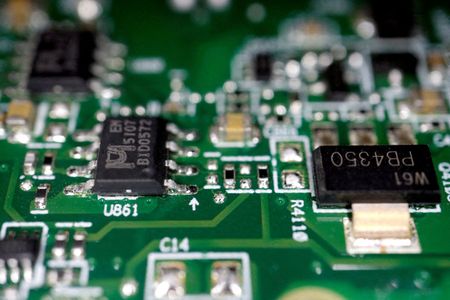By Sinéad Carew and Youn Ah Moon
NEW YORK/SINGAPORE (Reuters) – Trading in U.S. chip stocks was choppy on Thursday after a massive sell-off on Wednesday and a tumble in chip stocks in Asia after a report that the United States was considering tighter curbs on exports of advanced chip technology to China.
Semiconductor stocks took a dive Wednesday after Bloomberg News reported that U.S. President Joe Biden’s administration was weighing a measure called the foreign direct product rule that would allow the U.S. government to stop a product from being sold if it was made using American technology.
The reported U.S. move, if it happens, would potentially mean restrictions on companies such as Tokyo Electron and the Netherlands’ ASML.
The Global X Asia Semiconductor exchange-traded fund closed down 1.74% on Thursday with declines in major holdings including SK Hynix, Tokyo Electron, Taiwan Semiconductor Manufacturing Co (TSMC), and Samsung Electronics.
After opening up 1.7% on Thursday, the Philadelphia Semiconductor index reversed course and was down 0.8% on the day following a 6.8% sell-off on Wednesday, which was its biggest one-day drop since March 2020.
Some analysts cited Wednesday’s sell-off as a signal to bargain hunt. Vedvati Shrotre at Evercore ISI wrote that the near-term probability the trade curbs would be implemented is low and pointed to “near-term weakness as a unique buying opportunity.” Also Vivek Arya at Bofa cited current volatility as “enhanced opportunity in companies with best-profitability.”
But Daniel Morgan, portfolio manager at Synovus Trust sees more volatility ahead with chip company earnings due in coming weeks and both U.S. Presidential candidates, Donald Trump and Joe Biden, “taking a tough line” on trade.
“What you were seeing is buying on the weakness and then investors coming to the awareness that this is going to be a recurring concern as we head into the reporting season, that companies with a high level of sales exposure to China may be hurt,” said Atlanta, Georgia based Morgan.
He pointed to an almost 11% tumble in shares of ASML on Wednesday to illustrate worries about chip companies that disclose big exposure to China. Investors overlooked strong results at ASML, the biggest supplier of computer chip- making equipment, because roughly half its sales came from China, Morgan said.
But he noted that investors were equally worried about Trump implementing tariffs when he was President yet “chip companies have survived and have done extremely well since then.”
The biggest gainers in the U.S. index were Intel up 3.8%, GlobalFoundries Inc, up 2.3% and NXP Semiconductor, up more than 1%. Artificial intelligence poster-child Nvidia was up just 0.5% while Advanced Micro Devices was down more than 3% after falling more than 10% on Wednesday, in its biggest sell-off since October 2022.
After shares of TSMC, the world’s largest contract chipmaker, showed some of the biggest declines in Asia, its U.S. traded shares were down 3.6%. In Asian trade TSMC had shed T$1.7 trillion ($52.13 billion) market value in two days.
It likely helped that TSMC, the world’s largest contract chipmaker, raised its full-year revenue forecast on Thursday on surging artificial intelligence (AI) related demand for chips.
But adding to the gloom for TSMC, U.S. Republican presidential nominee Donald Trump said Taiwan should pay America for its defense.
In Europe ASML shares had closed down 3.6% on Thursday while its U.S. listed shares were off 1.8%.
In Asia, South Korean memory chipmaker SK Hynix had slid 3.6% while Japan’s Tokyo Electron, had slumped 8.75%.
(This story has been corrected to fix typographical errors in paragraphs 2 and 9, to add the missing number in paragraph 5, and to insert a missing space in paragraph 13)
(Reporting by Sinéad Carew and Saqib Iqbal Ahmed in New York, Youn Ah Moon and Joyce Lee in Seoul, Jeanny Kao in Taipei, Ankur Banerjee in Singapore and Alun John in London; Writing by Rae Wee; Editing by Jamie Freed, Christian Schmollinger and David Evans)





